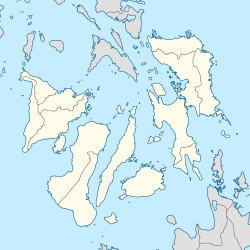History
Established in 1947 as an elementary school under the name East Negros Institute, the institution has evolved over the years. Renamed Diaz College in 1997 to honor its founders, Don Miguel and Doña Maria "Iyay" Diaz, the school has steadily expanded its academic programs and enrollment. Its students are from Tanjay City and the surrounding areas of Negros. [1]
Diaz College [2] is a private liberal arts college known for its strong emphasis on critical thinking, interdisciplinary learning, and personalized attention to students. [3] The college offers a wide range of undergraduate and graduate programs in the arts, sciences, business, education and technology. [4] Diaz College prides itself on fostering a close-knit community, encouraging intellectual curiosity, and preparing students for successful careers and lifelong learning. [5] [6] The campus is known for its beautiful surroundings and modern facilities, providing an ideal environment for academic and personal growth. The school was granted a government permit in July 1947 to hold classes on a rented site, with 424 registered students, under the name of East Negros Institute (ENI). The groundbreaking for the school's site was held on October 11, 1947. [7] [8]
Diaz College acquired eight hectare site of Lawton Drive, Tanjay City. [9] The legacy of the motto Strive-Seek-Learn has inscribed imprints in a number of professionals. On October 11, 1997, marked the Golden year of the institution. [10]
School emblem
- School seal
"For every member of the DCian community, the school emblem represents craftsmanship and dedication. Each symbol embodies the illustrious mission and vision of the school. The open book and illuminated torch signify the moral duty of the academic institution since its establishment in 1947, which is to educate every student to become a value-driven and service-oriented citizen. The DCian motto, inscribed as STRIVE-SEEK-LEARN, urges every member of the community to strive for justice, seek truth, and embrace moral virtues. The array of noble laurels symbolizes honor, distinguished achievements, and meritocracy in every endeavor undertaken by a DCian. The tree with radiating rings symbolizes the guardians of knowledge: the Mind to think, the Heart to feel, and the Hand to execute actions guided by the Truth." [11]
- Student publications
The Anahaw Publication is the official weekly student publication of the Diaz College system, one of the weekly student newspapers in the country. It is a publication by students from High School, Senior High School, and College Departments. [12]
- Administration
|
| School President | School Director |
| Rodrigo G. Diaz (2024–present) | Dr. Romulo T. Mirasol Jr. (2024–present) |
- Gallery of Diaz College school buildings
Diaz College registrar office building.
Diaz College school building Senior High and Junior Department.
Diaz College school building of Commerce and Accountancy.
- Gallery of Diaz College school facilities
Senior high programs
The Senior High School was added in the 2016-2017 school year and offers Academic, Technical-Vocational-Livelihood (TVL), Arts and Design, and Sports tracks. Each track includes various strands, namely: Humanities and Social Sciences (HUMSS), Science, Technology, Engineering, and Mathematics (STEM), Accountancy, Business, and Management (ABM), General Academic Strand (GAS), Information and Communication Technology (ICT), Sports, and different TVL specializations. Both JHS and SHS offer the Open High School Program to expand access to basic education. [15]
This page is based on this
Wikipedia article Text is available under the
CC BY-SA 4.0 license; additional terms may apply.
Images, videos and audio are available under their respective licenses.






